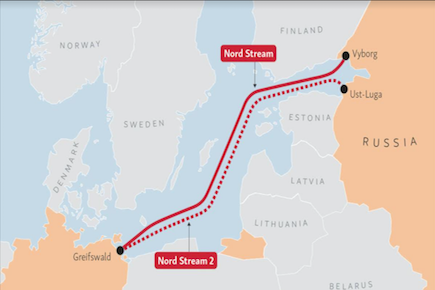
Diplomatic talks continue across Europe and in the U.S., in an attempt to avert a Russian invasion of Ukraine. Although Russia has deployed more than 100,000 troops along Ukraine’s border, Moscow has always denied that there are any plans to invade Ukraine. After US President Joe Biden issued a specific warning that a Russian attack could be launched as soon as Feb. 16, Ukraine’s President Volodymyr Zelensky responded by declaring Feb. 16 a “day of unity,” and praised the strength of the Ukrainian military.
As part of a diplomatic offensive to prevent a possible invasion, Germany’s Chancellor Olaf Scholz scheduled a meeting with Russia’s President Vladimir Putin on Feb. 15. Earlier, Scholz had met with President Biden in Washington to present a united front against a possible Russian attack. But while Biden explicitly declared the Nord Stream 2 natural gas pipeline from Russia to Germany wouldn’t go forward if Russia invades Ukraine, Scholz declined to commit to ending the pipeline if an attack is launched.
Between The Lines’ Scott Harris spoke with John Foster, a Canadian petroleum economist, who worked at the World Bank, Inter-American Development Bank, BP and Petro-Canada. Here he discusses the danger of war in Ukraine and why the Nord Stream 2 Pipeline and Europe’s dependence on Russian gas is a key element in the unfolding Ukraine crisis.
JOHN FOSTER: For me, the real danger is not the Russians attacking, which I don’t believe they would, it’s in their worst interest to do that. The real danger is hothead militias in Ukraine attacking the Donbas, which they did in 2014 — in which case, Russia would come to Donbas’ rescue as they said they would. In what form, we don’t know. It might be troops on the ground, it might not be because Russia is right next door and they’ve got long-distance artillery and airplanes and whatnot.
But if Russia came in in that fashion, it’s like a bear trap. So Washington would insist on Western sanctions and there are three or four sanctions on the table as I understand it. I don’t see agreement between NATO countries on them. But the ones that are being pushed from Washington would be that Germany cancel going ahead with Nord Stream 2, a completed pipeline, but awaiting certification by the regulatory authorities. So it’s like they’re in limbo.
And the second one is how to pay for the gas, which brings in the swift financing mechanism. That’s an idea that might be dropped. And the third one is putting sanctions on major Russian banks. If do that, it’s a big issue. How would you pay for the gas? That is another thing.
If there were a war of that kind of whatever intensity, less or more, what about the gas that goes through Ukraine? To Europe from Russia? That’s the old traditional way that gas went since the 1960s from the Soviet Union, then to Europe. My belief would be that for reasons of safety, those lines would be closed, it would be shut down during the hostilities.
So that would leave Europe in an absolute mess. Because if the European Union relies upon Russia for 40 percent or so, of its gas. Then the question is could they get gas from anywhere else? And in that quantity, which is a very, very big quantity. And in my view, the answer is no.
SCOTT HARRIS: Given the fact that Europe is dependent in large part on Russian natural gas for their energy needs, your understanding of this situation is that both Europe and Russia would lose if a conflict interferes with the flow of natural gas across borders there. Russia petrostate gets a lot of money from European purchase of their gas.
JOHN FOSTER: That’s right.
SCOTT HARRIS: And on the other hand, Europe is very dependent on Russia for its energy needs. If I’m reading this right, it seems both sides have more to lose than to gain if a war were to break out.
JOHN FOSTER: Scott, that’s the way I see it completely. It’s like, you know, yin and yang or it takes two to tango. Russia wants to sell gas. Europe wants to buy the gas. And so they each have a trading reason for the deal. And, if gas were cut off in this fashion — Nord Stream 2 not going ahead, gas being shut down going through Ukraine — Europe would have an economic crisis that is not experienced since, I guess, World War II. That I think, to my mind, accounts for the press conference, which was really quite fascinating to read the transcript of at the White House, when German Chancellor (Olaf) Scholz visited and in the meeting the press afterwards in the joint conference, the German Chancellor Scholz refused to say that he would cancel Nord Stream 2 if Russia were to attack Ukraine.
But it was President Biden who said that the U.S. would get Germany to cancel. So then, as I watched it, there were three journalists who were trying to push Scholz on the matter and he just stonewalled. He wouldn’t admit one way or the other as to what Germany would do in that circumstance, but just saying we’re on track. We’re all on the same message — Germany, the U.S. and others.
Presumably, he’s been in Kiev and he’ll be in Moscow. My sense of the matter is that it’s because sanctions, if they were imposed, would hurt Germany, would hurt Europe more than Russia and far more than the U.S. or Canada if it were to come to that. They’ll be fairly intact. Other than the fact that world prices for gas, of course, would go shooting up.
John Foster is author of the book, Oil and World Politics: the Real Story of Today’s Conflict Zones.
Listen to Scott Harris’ in-depth interview with John Foster (27:16) and see more articles and opinion pieces in the Related Links section of this page.




